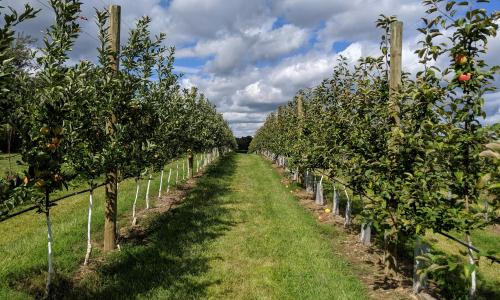Organic fertilizers provide important inputs for sustainable farmers. As food production becomes more challenging globally, the need for efficient and eco-friendly nutrient sources allow for greater long-term soil fertility and crop production. In the context of phosphorus, rock phosphate emerges as a promising solution.
What is Rock Phosphate?
Rock phosphate is a natural mineral deposit derived from ancient marine sediment deposits. It is rich in phosphorus, an essential nutrient for plant growth and development. Unlike chemically synthesized phosphorus fertilizers, rock phosphate is a natural and sustainable option that aligns with organic, sustainable, and regenerative farming principles.
Benefits of Rock Phosphate
Rock phosphate has a high phosphorus content, typically containing 20-30% phosphate (P₂O₅).
Phosphorus is a key component in DNA, energy transfer, and cellular growth, making it crucial for plant health and productivity.
Rock phosphate's continual release characteristics allow plants to access phosphorus gradually over an extended period, preventing nutrient leaching and reducing the risk of over-fertilization. Minimizing environmental losses leads to increased nutrient availability for crops and reduced expenditure on fertilizers.
Rock phosphate enhances soil fertility and structure by providing a high quality source of phosphorus, calcium, and other essential minerals. It promotes root development, improves nutrient availability, and enhances overall soil health.
Unlike some synthetic fertilizers that can cause damage to seeds or negatively impact germination rates at high application rates, rock phosphate poses no phytotoxic effects.
Rock phosphate offers a cost-effective alternative to synthetic fertilizers, as it has a longer-lasting effect due to its slow-release properties. While the initial application may be higher, the extended nutrient availability translates into reduced fertilizer requirements over time.
Applications of Rock Phosphate
Crop Production: Rock phosphate is widely used in farming systems to boost crop yields, with applications in various crops, including cereals, legumes, vegetables, fruits, and oilseeds.
Soil Restoration: In areas where intensive agriculture has led to soil degradation, nutrient depletion, and high salinity, rock phosphate can assist in rehabilitating the soil. Its nutrient content, slow-release properties and low salt characteristics ensure sustained nutrient availability, promoting soil fertility and ecosystem resilience.

Environmental Advantages
Reduced Environmental Impact: Unlike synthetic fertilizers that may contribute to water pollution and ecological imbalances, rock phosphate offers an environmentally friendly alternative. Its natural properties minimizes nutrient runoff and leaching, thereby reducing the risk of water contamination.
Conservation of Finite Resources: Rock phosphate is a non-renewable resource, and its sustainable use is essential to preserve it for future generations. By using rock phosphate in its natural state, we are preserving its nutritional content and essential trace minerals that encourage soil health. Instead of chemically altering it and removing the calcium and trace mineral components, we recognize the significance of maintaining its inherent properties.
Efficient Solution for Modern and Conventional Agriculture
With its high phosphorus content, slow-release properties, and soil-enriching benefits, it supports crop growth, improves soil fertility, and reduces environmental impact. As we strive for a more sustainable future, embracing fertilizers like rock phosphate becomes crucial in achieving long-term agricultural growth while preserving this non-renewable resources.
Why Fertoz Rock Phosphate Stands Out Amongst Other Sources
Fertoz maintains quality control measures throughout its production process. From the selection of high-grade rock phosphate deposits to the minimalist processing techniques, Fertoz ensures that its rock phosphate maintains consistent purity and nutrient content.
Fertoz rock phosphate is approved for organic use by recognized accreditation bodies throughout Canada and The United States. It is also registered and licensed throughout North America. This confirms that the product is sourced and processed according to government standards and regulations, and organic agencies, ensuring that it is free from synthetic chemicals and other contaminants.
Fertoz understands the importance of soil health. Therefore, they offer rock phosphate in different formulations tailored to specific soil types and crop requirements. These formulations consider factors such as pH levels, cation exchange capacity, and nutrient interactions, ensuring optimal nutrient availability and uptake by plants.
Fertoz is dedicated to sustainability. Their rock phosphate is sourced from regions with minimal environmental impact, and they prioritize responsible mining and reclamation processes. Fertoz actively participates in initiatives to reduce greenhouse gas emissions and promote sustainable farming practices.
Visit www.fertoz.com, a reliable source for organic fertilizer solutions, including rock phosphate.



